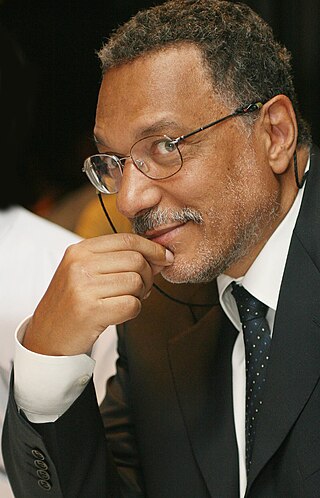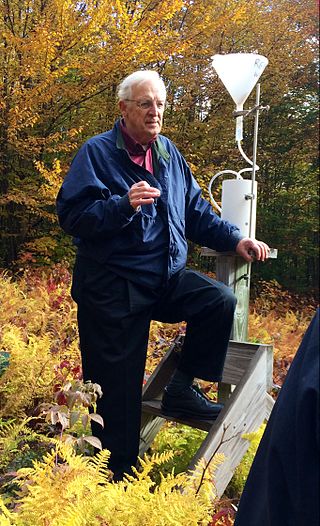Related Research Articles

Maurice Frederick Strong, was a Canadian oil and mineral businessman and a diplomat who served as Under-Secretary-General of the United Nations.

Daniel Pauly is a French-born marine biologist, well known for his work in studying human impacts on global fisheries and in 2020 was the most cited fisheries scientist in the world. He is a professor and the project leader of the Sea Around Us Project at the Institute for the Oceans and Fisheries at the University of British Columbia. He also served as Director of the UBC Fisheries Centre from November 2003 to October 2008.
The Natural Environment Research Council (NERC) is a British research council that supports research, training and knowledge transfer activities in the environmental sciences.

Herman Edward Daly was an American ecological and Georgist economist and professor at the School of Public Policy of University of Maryland, College Park in the United States, best known for his time as a senior economist at the World Bank from 1988 to 1994. In 1996, he was awarded the Right Livelihood Award for "defining a path of ecological economics that integrates the key elements of ethics, quality of life, environment and community."

Daniel Hunt Janzen is an American evolutionary ecologist, and conservationist. He divides his time between his professorship in biology at the University of Pennsylvania, where he is the DiMaura Professor of Conservation Biology, and his research and field work in Costa Rica.

Lester Russel Brown is an American environmental analyst, founder of the Worldwatch Institute, and founder and former president of the Earth Policy Institute, a nonprofit research organization based in Washington, D.C. BBC Radio commentator Peter Day referred to him as "one of the great pioneer environmentalists."

Gene Elden Likens is an American limnologist and ecologist. He co-founded the Hubbard Brook Ecosystem Study at the Hubbard Brook Experimental Forest in 1963, and founded the Cary Institute of Ecosystem Studies in Millbrook, New York in 1983.

Susan Solomon is an American atmospheric chemist, working for most of her career at the National Oceanic and Atmospheric Administration. In 2011, Solomon joined the faculty at the Massachusetts Institute of Technology, where she serves as the Ellen Swallow Richards Professor of Atmospheric Chemistry & Climate Science. Solomon, with her colleagues, was the first to propose the chlorofluorocarbon free radical reaction mechanism that is the cause of the Antarctic ozone hole.
The M. S. Swaminathan Research Foundation (MSSRF) is a nonprofit NGO trust based in Chennai, India. It develops and promotes strategies for economic growth that directly target increased employment of poor women in rural areas. Their methods maximize the use of science and technology for equitable and sustainable social development and environmental stability. The MSSRF logo signifies continuity and change, invoking the DNA model of open-ended, many-sided, and continuous evolution.
Mathis Wackernagel is a Swiss-born sustainability advocate. He is President of Global Footprint Network, an international sustainability think tank with offices in Oakland, California, and Geneva, Switzerland. The think-tank is a non-profit that focuses on developing and promoting metrics for sustainability.

Hans Joachim "John" Schellnhuber is a German atmospheric physicist, climatologist and founding director of the Potsdam Institute for Climate Impact Research (PIK) and former chair of the German Advisory Council on Global Change (WBGU).

The Global Footprint Network was founded in 2003 and is an independent think tank originally based in the United States, Belgium and Switzerland. It was established as a charitable not-for-profit organization in each of those three countries. Its aim is to develop and promote tools for advancing sustainability, including the ecological footprint and biocapacity, which measure the amount of resources we use and how much we have. These tools aim at bringing ecological limits to the center of decision-making.

The Volvo Environment Prize is a highly regarded annual scientific award. The prize is awarded to individuals who "explore the way to a sustainable world." The prize is awarded by the independent foundation The Volvo Environment Prize Foundation instituted in 1989. A recipient of the Volvo Environment Prize receives an original diploma, a glass sculpture and a cash award for SEK 1.5 million.

Johan Rockström is a Swedish scientist, internationally recognized for his work on global sustainability issues. He is joint director of the Potsdam Institute for Climate Impact Research (PIK) in Germany, together with economist Ottmar Edenhofer. He is also Professor in Earth System Science at the University of Potsdam and Professor in Water Systems and Global Sustainability, Stockholm University.

Daniel Sperling is the American founding Director of the Institute of Transportation Studies at the University of California, Davis (ITS-Davis); Professor of Civil and Environmental Engineering; Professor of Environmental Science and Policy; and Faculty Director of the Policy Institute for Energy, Environment, and the Economy at the University of California, Davis.
Richard Charles Thompson is a marine biologist who researches marine litter. At the University of Plymouth he is director of the Marine Institute; professor of Marine Biology; and leads the International Marine Litter Research Unit. Thompson coined the term "microplastics" in 2004.

The Earthshot Prize is a global environmental award that is rewarded to five winners each year for their contributions towards environmentalism. It was first awarded in 2021 and is planned to run annually until 2030. Each winner receives a grant of £1 million to continue their environmental work. The five categories were inspired by the UN Sustainable Development Goals; they are 'restoration and protection of nature', 'air cleanliness', 'ocean revival', 'waste-free living', and 'climate action'.
Markus Borner was a Swiss zoologist and conservationist. He was a head of the Frankfurt Zoological Society’s Africa program for over 20 years. He worked at Serengeti National Park in Tanzania, Africa for over 40 years. There among others he studied wildlife migration patterns as well as was engaged in wildlife conservation activities.

The VinFuture Prize is an annual international award that honors remarkable scientific breakthroughs and promotes innovations for mankind, with involvement from world-renowned scientists, policymakers, business leaders, and Prize holders. It is the first influential and worldwide prize to be founded in Vietnam, and it is hosted by the VinFuture Foundation.
References
- ↑ "About the Blue Planet Prize". af-info.or.jp.
- ↑ UNEP. 2012. Blue Planet Prize winners call for transformational change to achieve sustainable development Archived 2016-03-04 at the Wayback Machine . Press release. 10 February 2011.
- ↑ Pearce. F. 2012. Earth Summit is doomed to fail, say leading ecologists. New Scientist website. 10 February 2012.